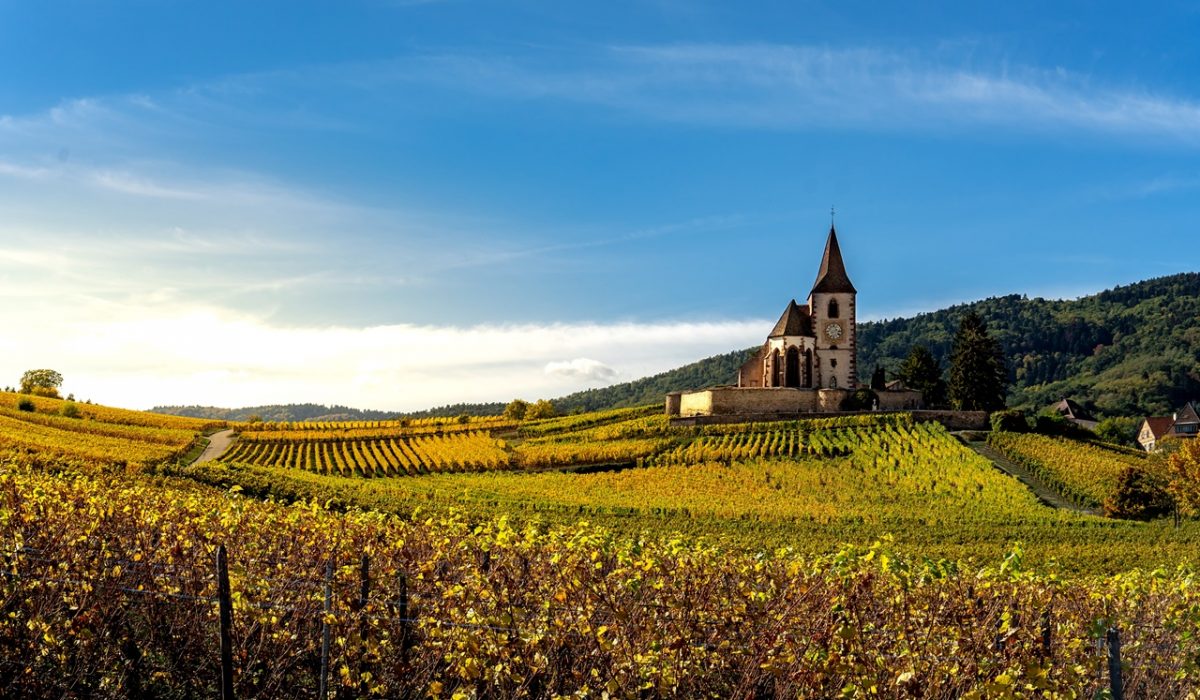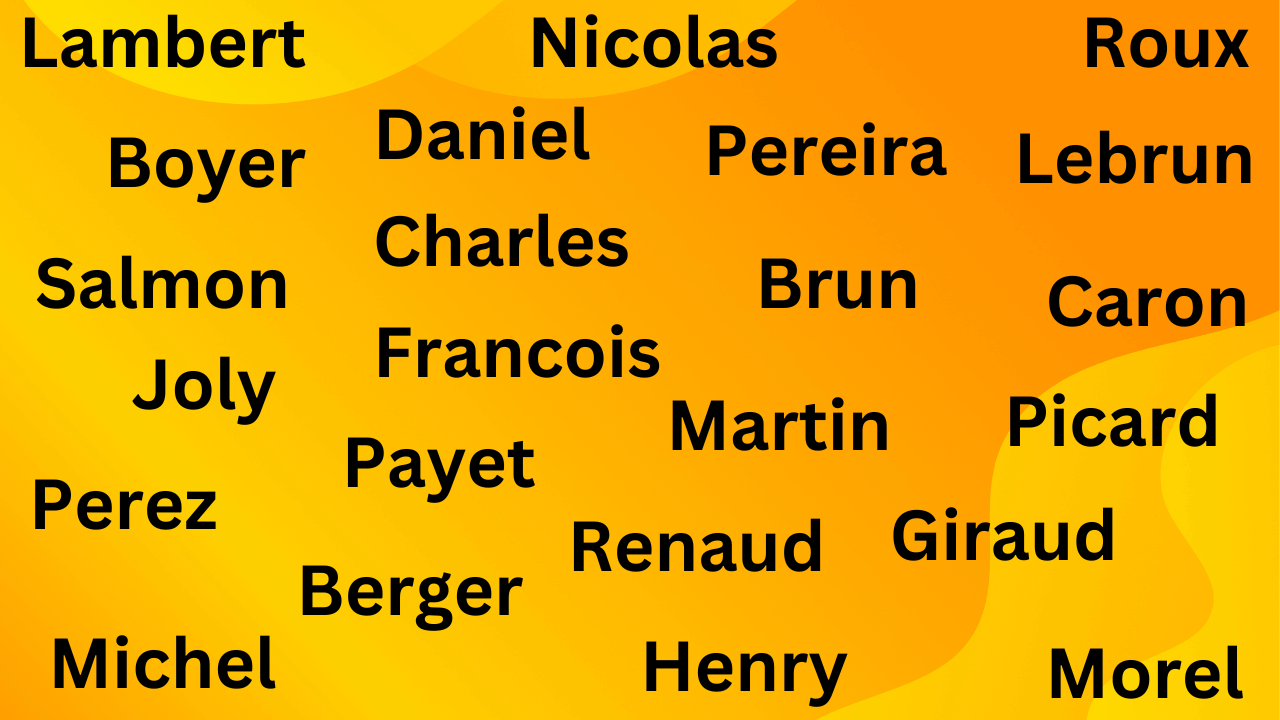Have you ever wondered why French surnames sound so elegant and rich in history? Surnames from France carry with them centuries of culture, tradition, and stories that define the identity of millions around the world. Whether you're tracing your ancestry or simply fascinated by the allure of French names, this article will take you on an unforgettable journey through the roots of French family names.
Picture this: you're strolling through the cobblestone streets of Paris, sipping on café au lait, and you notice a street sign that reads "Rue Dupont." That name might seem familiar, but do you know where it comes from? French surnames are more than just names; they're pieces of history, each carrying a tale of its own. From noble origins to humble beginnings, these names paint a vivid picture of France's vibrant past.
Now, let's dive deeper into the world of French surnames. This article isn't just about listing names; it's about understanding their significance, uncovering their origins, and appreciating their beauty. Whether you're a history buff or someone curious about their roots, you're in for a treat. So grab your favorite beverage, get comfy, and let's explore the fascinating realm of surnames from France!
Read also:Is Camryn Manheim Gay Exploring The Life Career And Personal Journey Of A Trailblazing Actress
Table of Contents
- The History Behind Surnames from France
- Origins of French Surnames
- Types of French Surnames
- Noble Surnames in France
- Common Surnames from France
- Regional Variations of French Surnames
- Famous Personalities with French Surnames
- Modern Usage of Surnames from France
- Tracing Your French Surname
- The Future of French Surnames
The History Behind Surnames from France
French surnames have been around for centuries, evolving alongside the nation's history. Back in the day, people didn't need last names because communities were small, and everyone knew each other. But as populations grew, the need for distinguishing names became essential. Around the 11th century, surnames started to emerge, and by the 16th century, they were pretty much a thing.
One cool fact? The French Revolution played a big role in shaping surnames. Before that, noble families had fancy titles, but after the Revolution, everyone was equal in the eyes of the law. This shift led to more standardized naming conventions, making it easier to track family lineage. So yeah, if you've got a French surname, you're part of a long, rich tradition.
Why Surnames Matter
Surnames aren't just random words; they're a way to connect with your past. They tell stories about where your ancestors lived, what they did for a living, and even their personality. For example, the surname "Dupont" means "of the bridge," which might suggest that the family lived near a bridge. Cool, right?
Origins of French Surnames
So where do these surnames come from? Well, there are a few main sources. Some are based on geography, like "Leclerc" which means "the clerk." Others come from occupations, like "Boucher" which means "butcher." And then there are those based on nicknames, like "Le Gros" meaning "the fat one." It's like a snapshot of medieval life.
Interestingly, some surnames were even inspired by nature. Names like "Forestier" (forester) or "Rivière" (river) reflect the close relationship between early French people and the natural world. It's like they were naming themselves after the beauty around them.
Religious Influence
Religion also played a big role in shaping French surnames. Names like "Dupuis" (from "puits," meaning well) or "Saint-Clair" were inspired by religious figures or places. This influence is still visible today, with many French surnames carrying a spiritual undertone.
Read also:Squishmallows Names The Ultimate Guide To Finding Your Favorite Fluffy Companion
Types of French Surnames
French surnames can be broadly categorized into four types: patronymic, occupational, geographical, and descriptive. Let's break it down:
- Patronymic: These are based on the father's name, like "Dupuis" meaning "son of Puis."
- Occupational: Reflecting the family's trade, like "Boulanger" meaning "baker."
- Geographical: Indicating where the family lived, like "Delaunay" meaning "of the moon."
- Descriptive: Based on physical or personality traits, like "Le Petit" meaning "the small one."
Hyphenated Surnames
Hyphenated surnames are also quite common in France. They often result from marriages between noble families or from combining two existing names. For example, "De la Fontaine" combines "de" (of) and "la fontaine" (the fountain). These names add an extra layer of complexity and elegance.
Noble Surnames in France
Now, let's talk about the fancy ones. Noble surnames in France often carry prefixes like "de," "du," or "le," signifying aristocratic origins. Names like "de Gaulle" or "du Pont" were once reserved for the upper class. But with the passage of time, these prefixes have lost some of their exclusivity, becoming more common.
Fun fact: the "de" in a surname doesn't always mean noble origins. Sometimes, it simply indicates where the family came from. So don't assume someone's a count just because they have "de" in their name!
Famous Noble Surnames
Some of the most famous noble surnames include:
- Montesquieu
- Rousseau
- Voltaire
These names are not just part of French history; they're part of global cultural heritage.
Common Surnames from France
Not all French surnames are fancy. In fact, some of the most common ones are pretty straightforward. Names like "Martin," "Dubois," and "Moreau" are everywhere in France and beyond. But don't let their simplicity fool you; these names have deep roots and fascinating stories.
For instance, "Martin" comes from the Latin name Martinus, meaning "warlike." "Dubois" means "of the woods," and "Moreau" is derived from "maurus," meaning dark-skinned. Each name tells a unique story about its bearer's ancestors.
Statistics on Common Surnames
According to recent data, the most common surnames in France are:
- Martin (over 400,000 people)
- Dubois (around 350,000 people)
- Bernard (about 300,000 people)
These numbers show just how widespread and influential these names are in modern France.
Regional Variations of French Surnames
France is a big country, and different regions have their own unique naming conventions. In Brittany, for example, you'll find lots of names ending in "-ec" or "-ic," like "Le Goff" or "Troadec." Meanwhile, in Provence, names like "Riou" or "Aubert" are more common.
These regional variations reflect the diverse cultural influences that shaped France over the centuries. From the Celtic roots in Brittany to the Italian influence in the south, each region adds its own flavor to the naming tradition.
Language Impact
Language also plays a role in regional variations. In Alsace, for example, many surnames have Germanic roots due to the region's historical ties with Germany. Names like "Schmitt" or "Muller" are common here, blending French and German cultures.
Famous Personalities with French Surnames
French surnames have graced some of the world's most famous personalities. From artists like Monet and Degas to writers like Camus and Sartre, these names have left an indelible mark on history.
And let's not forget the political figures. Names like De Gaulle and Mitterrand are synonymous with leadership and vision. Each of these surnames carries a legacy that continues to inspire generations.
Celebrity Influence
Even in modern times, French surnames have a certain je ne sais quoi. Celebrities like Juliette Binoche and Vincent Cassel have kept the allure of French names alive on the global stage. Their success has helped bring French culture to the forefront of international recognition.
Modern Usage of Surnames from France
In today's world, French surnames are more popular than ever. They're used not just in France but around the globe, thanks to migration and globalization. Many people choose French names for their children because of their elegance and timeless appeal.
Moreover, French surnames are often associated with sophistication and style. Brands and businesses use them to convey a sense of luxury and quality. So whether you're sipping champagne or driving a Peugeot, you're experiencing the influence of French naming traditions.
Adaptation and Change
As cultures mix and evolve, so do surnames. Many French names have been adapted to fit local languages and customs. For example, "Dupont" might become "Dupon" in English-speaking countries. This adaptation keeps the names relevant and accessible in a changing world.
Tracing Your French Surname
If you're curious about your own French surname, there are plenty of resources available. Online genealogy sites and archives can help you trace your family tree and discover the origins of your name. It's like solving a puzzle, piece by piece.
And don't forget to visit France if you can! Walking the streets where your ancestors once lived can be a powerful experience. You might even find a street or building named after your family.
Genealogical Tools
Some useful tools for tracing French surnames include:
- French National Archives
- Geneanet
- FamilySearch
These platforms offer a wealth of information for anyone looking to uncover their French heritage.
The Future of French Surnames
As the world becomes more interconnected, French surnames will continue to evolve. They'll adapt to new languages, cultures, and technologies, but their essence will remain the same. These names will always carry the stories of their ancestors, connecting people across time and space.
So whether you're a proud bearer of a French surname or simply fascinated by their history, remember this: these names are more than just words. They're a testament to the rich, diverse, and enduring legacy of France.
Final Thoughts
Exploring surnames from France is like opening a treasure chest full of stories and secrets. Each name has its own unique journey, shaped by history, culture, and the people who bore it. By understanding these names, we gain a deeper appreciation for the world around us and our place in it.
So next time you come across a French surname, take a moment to think about its origins. You might just discover something amazing about your own family's past. And who knows? Maybe your surname will inspire someone else's journey of discovery.
Kesimpulan
French surnames are more than just names; they're pieces of history, culture, and identity. From their humble beginnings to their global influence today, these names have played a significant role in shaping the world. By understanding their origins, types, and significance, we can appreciate the rich tapestry of French heritage.
We invite you to share your thoughts and experiences in the comments below. Have you traced your French surname? What did you discover? And don't forget to explore more articles on our site for even more fascinating insights into the world of surnames!


